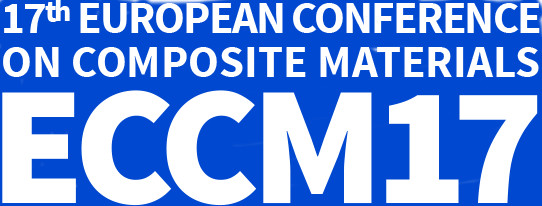

App-Einstellungen:
Information
Here you can download the papers of the ECCM17 separately. They are sorted by their presentation ID.
DEVELOPMENT OF AN LCA-TOOL FOR THE COMPOSITES-INDUSTRY - EUCIA ECO CALCULATOR: CRADLE TO GATE LCA FOR COMPOSITE PARTS
Jaap van der Woude (EuCIA) Ir. Ben Drogt (EuCIA) R. Frassine (EuCIA)
A web-based tool to calculate Eco Impact Factors as defined by ILCD for composites from cradle to gate and can be used for futher calculations. The methodology has followed the LCA Guidelines as described in ISO 14040 and 14044 standards.
EFFECT OF DIFFERENT TECHNOLOGICAL AND ENERGY SUPPLY RELATED MEASURES ON THE PRIMARY ENERGY DEMAND OF CFRP PRODUCTION
Daniel Wehner (Fraunhofer IBP) Andrea Hohmann (Fraunhofer ICT) Bernhard Schwab (Fraunhofer ICT) Stefan Albrecht (Fraunhofer IBP) Robert Ilg (Fraunhofer IBP) K. Sedlbauer (Fraunhofer IBP) P. Leistner (Fraunhofer IBP) Klaus Drechsler (Technical University of Munich / Institute for Carbon Composites)
The paper investigates on the major levers for optimizing energy use in CFRP production and processing in order to support the various actors involved along the different process routes in CFRP manufacturing.
ENERGY EFFICIENCY AND ECOLOGICAL BENEFITS OF A SELF-HEATED CFRP-TOOL DESIGNED FOR RESIN TRANSFER MOULDING
Elisa Arikan (Fraunhofer ICT) Andrea Hohmann (Fraunhofer ICT) Philipp Kammerhofer (Technical University of Munich / Institute for Carbon Composites) Matti Reppe (Qpoint Composite GmbH) Niklas Remer (Airbus Helicopters) Klaus Drechsler (Technical University of Munich / Institute for Carbon Composites)
The study shows that a self-heated CFRP tool leads to energy savings of 87 % during the use-phase. Combined with a RTM process a cycle time reduction of 41 % can be achieved. The LCA identifies a saving potential in all regarded impact categories.
OPTIMISATION OF SOLVOLYSIS FOR RECYCLING CARBON FIBRE REINFORCED COMPOSITES
Matthew Keith (University of Birmingham) Geraldine Oliveux (University of Birmingham) Gary Leeke (Cranfield University)
Recycling CFRCs is investigated with an acetone/water solvent to determine optimum parameters such as reaction time, loading and post-solvolysis steps. Results show a resin removal of 98% is possible with an energy of 19 MJ.kg-1 of fibre recovered.
A COST-EFFECTIVE CHEMICAL APPROACH TO RETAINING AND REGENERATING THE STRENGTH OF THERMALLY RECYCLED GLASS FIBRE
Sairah Bashir (University of Strathclyde) Liu Yang (University of Strathclyde) R. Anderson (University of Strathclyde) N. B. Basri (University of Strathclyde) E. Saez-Rodriguez John Liggat (University of Strathclyde) James Thomason (University of Strathclyde)
This paper explores alkaline treatments applied to thermally damaged glass fibres with the aim of restoring strength. Successful strength increase could potentially lead to reuse of thermally recycled glass filaments in composite applications.
A DRY ALIGNING METHOD OF RECYCLED DISCONTINUOUS FIBERS FOR HIGH PERFORMANCE CFRTP
Miyake Takushi (Gifu University) Imeda Satoshi (Gifu University)
A dry fiber alignment method is newly developed for long reclaimed carbon fiber by utilizing modified yarn manufacturing process with using fluffy synthetic fibers as suspension of discontinuous carbon fiber.
CARBON COMPOSITES RECYCLING STRATEGIES AND THEIR REALIZATION FOR NEW PRODUCTS
Stefan Schlichter (ITA Augsburg gGmbH)
Carbon waste is difficult to process on textile equipment due to a lack of “typical textile” properties. It is therefore necessary to modify all machines and working elements in a typical textile recycling line to achieve acceptable results.
CATALYSED THERMAL DECOMPOSITION OF MATRICES FOR CLOSED-LOOP RECYCLING OF FIBRE REINFORCED THERMOSETS
Kyle Pender (University of Strathclyde) Liu Yang (University of Strathclyde)
An investigation into catalysed thermal decomposition of epoxy resin was carried out with the goal to improve the commercial viability of glass/carbon fibre reinforced thermoset recycling.
EFFECT OF RECYCLING ON NATURAL FIBRE POLYPROPYLENE COMPOSITES REGARDING THE CRYSTALLIZATION BEHAVIOUR AND FIBRE LENGTH DISTRIBUTION
Amna Ramzy (Clausthal University of Technology) Ahmed ElSabbagh (Clausthal University of Technology) Leif Steuernagel (Clausthal University of Technology)
Sisal fibre reinforced polypropylene composite is multistep processed and thermal, mechanical and rheological properties are detected and correlated to the fibre's shape and their distribution.
